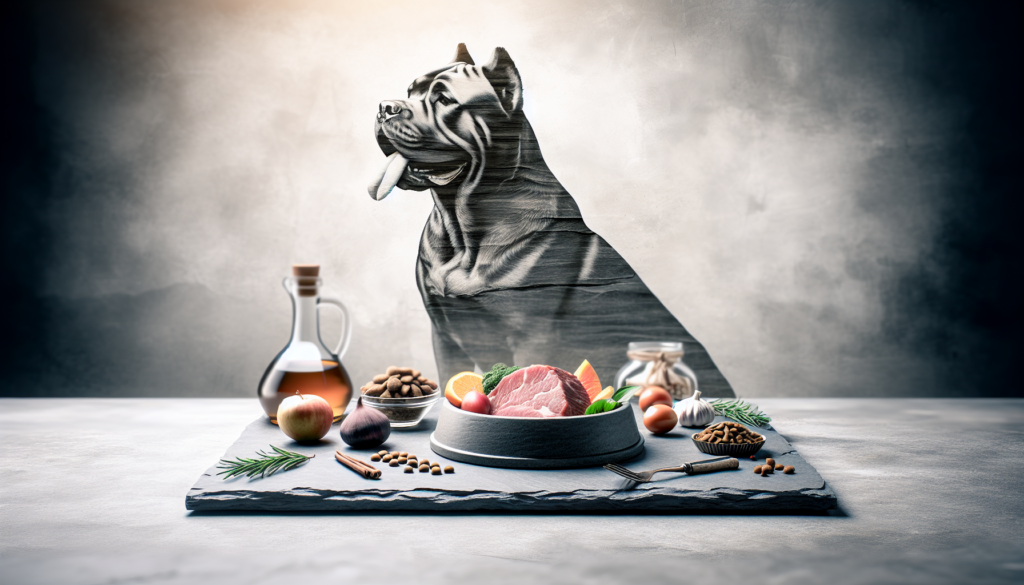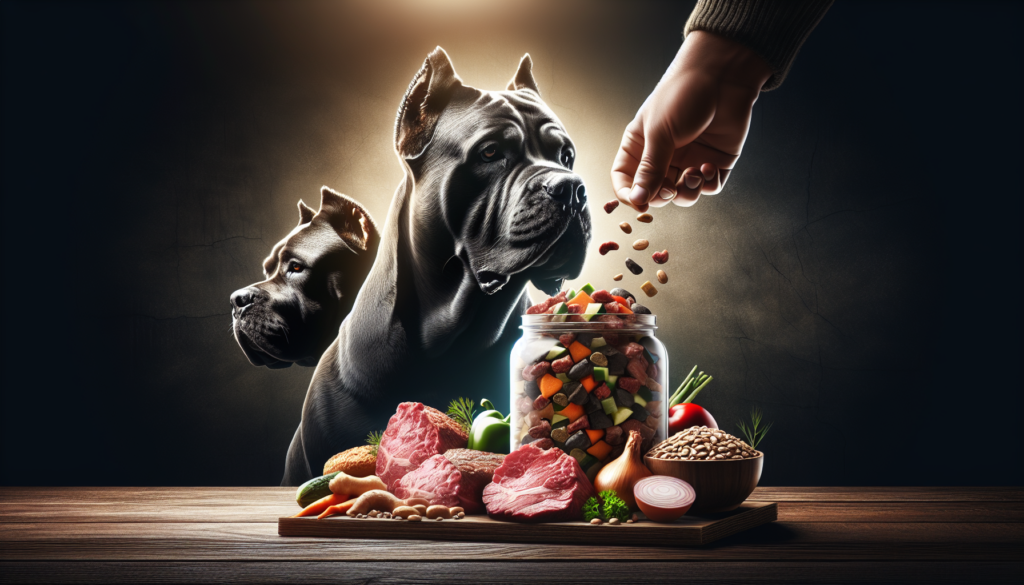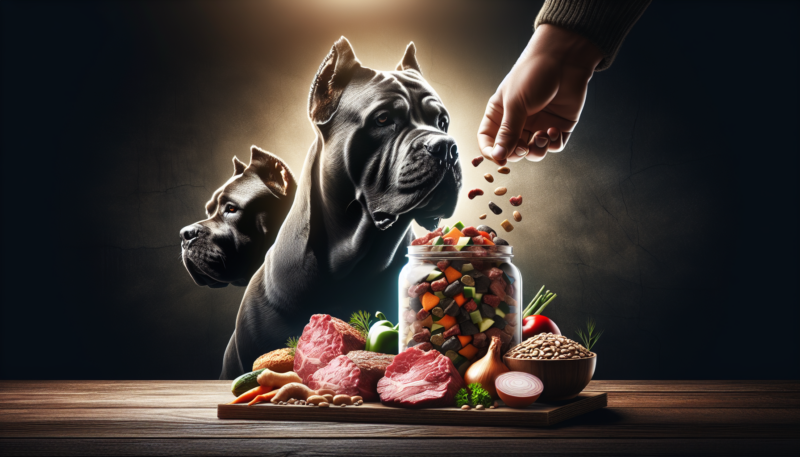Are you a proud owner of a Cane Corso? Well, if you are, then you know that providing them with a nourishing diet is essential for their overall health and well-being. In this ultimate guide, we will explore the dietary needs of Cane Corsos, helping you understand what they should eat to thrive. From the right balance of protein and carbohydrates to the importance of essential nutrients, get ready to discover everything you need to know about what Cane Corsos eat. So, let’s dive in and ensure that your beloved furry friend enjoys a diet that keeps them happy and healthy!

Introduction
Overview of Cane Corsos
Cane Corsos are large and powerful dogs that originated in Italy. They are known for their muscular build, strong jaws, and protective nature. Cane Corsos have specific dietary needs that must be met in order to maintain their health and well-being.
Importance of a Proper Diet
A proper diet is crucial for Cane Corsos to stay healthy and active. A well-balanced diet provides them with the necessary nutrients to support their growth, development, and overall vitality. It also helps prevent various health issues, such as obesity, allergies, and joint problems. Understanding Cane Corsos’ nutritional needs is essential for their optimal health.
Understanding Cane Corsos’ Nutritional Needs
Cane Corsos’ Dietary Requirements
Cane Corsos require a diet that is rich in high-quality protein, moderate in fat, and low to moderate in carbohydrates. Protein is essential for muscle development and repair, while fat provides energy and aids in the absorption of fat-soluble vitamins. Carbohydrates are a source of energy but should be limited to prevent excessive weight gain.
Recommended Macronutrient Ratios
When it comes to macronutrient ratios, it is generally advised to feed Cane Corsos a diet that consists of approximately 30-40% protein, 15-20% fat, and 30-50% carbohydrates. However, individual needs may vary depending on factors such as age, activity level, and overall health.
Understanding Breed-Specific Sensitivities
Cane Corsos may have certain sensitivities or predispositions to certain health issues. It is important to be aware of these breed-specific sensitivities when choosing their diet. Some common sensitivities in Cane Corsos include allergies, sensitive stomachs, and joint problems. By understanding these sensitivities, you can select a diet that caters to their specific needs.
Feeding Options for Cane Corsos
Choosing Between Commercial and Homemade Diets
When it comes to feeding options, Cane Corsos can be fed either commercial dog food or a homemade diet. Both options have their own advantages and disadvantages, so it is important to consider factors such as convenience, budget, and the specific needs of your individual dog.
Quality Commercial Dog Food Brands
If you choose to feed your Cane Corso commercial dog food, it is important to select a high-quality brand that meets their nutritional requirements. Look for brands that use real, named animal proteins as the main ingredient, avoid artificial additives and fillers, and have undergone rigorous quality control measures.
Benefits of Homemade Diets
Some dog owners prefer to prepare homemade diets for their Cane Corsos. Homemade diets allow for more control over ingredient selection and can be tailored to the specific needs of the dog. Additionally, homemade diets can minimize the risk of allergenic ingredients and provide a fresh and diverse range of nutrients.
Balancing a Homemade Diet
Creating a balanced homemade diet requires careful consideration of the dog’s nutritional needs. It is essential to include the right proportions of protein, fats, carbohydrates, vitamins, and minerals. Consulting with a veterinarian or a veterinary nutritionist can help ensure that the homemade diet is well-balanced and meets all the necessary requirements.
Supplementing with Fresh Foods
Whether you choose commercial or homemade diets, supplementing with fresh foods can provide additional nutrients and variety to your Cane Corso’s diet. Fresh fruits, vegetables, and lean meats can be used as treats or added to their meals. However, it is important to research which foods are safe and beneficial for dogs before introducing them into their diet.
Commercial Dog Food for Cane Corsos
Factors to Consider When Selecting Commercial Dog Food
When selecting commercial dog food for your Cane Corso, there are several factors to consider. These include your dog’s age, activity level, and any sensitivities or health conditions they may have. It is important to choose a food that is appropriate for their specific needs and provides a well-balanced nutritional profile.
Identifying High-Quality Dog Food
High-quality dog food should contain premium ingredients and be free from artificial additives, fillers, and by-products. Look for foods that are labeled as “complete and balanced” and have undergone feeding trials to ensure their nutritional adequacy. Quality dog foods often come from reputable brands that prioritize the health and well-being of dogs.
Understanding Dog Food Labels and Ingredients
Reading and understanding dog food labels is essential to make an informed decision. Ingredients are listed in descending order by weight, so look for a named animal protein as the first ingredient. Avoid foods that contain excessive amounts of fillers, artificial preservatives, colors, or flavors. Understanding the different terms used on labels, such as “natural” and “organic,” can also help in selecting the right food for your Cane Corso.
Specific Dietary Requirements for Cane Corsos
Cane Corsos may have specific dietary requirements based on their age or any existing health conditions. For example, puppies have different nutritional needs than adult or senior dogs. It is important to select a food that is tailored to their life stage and to consult with a veterinarian for personalized dietary recommendations.

Homemade Diets for Cane Corsos
Benefits and Drawbacks of Homemade Diets
Homemade diets offer several benefits, such as increased control over ingredient selection and customization to individual needs. They also provide an opportunity to avoid allergenic ingredients and offer a fresh and varied diet. However, preparing homemade diets can be time-consuming and requires knowledge of proper formulation to ensure a balanced and nutritionally complete diet.
Choosing the Right Ingredients
When preparing a homemade diet for your Cane Corso, it is important to choose high-quality ingredients that meet their nutritional requirements. Include a variety of proteins, such as lean meats, fish, and eggs, along with carbohydrates from sources like grains, sweet potatoes, and legumes. Fruits and vegetables can provide additional vitamins and minerals.
Managing Portion Sizes
Determining the appropriate portion sizes for homemade diets can be challenging. Factors such as age, activity level, and metabolism should be considered. It is important to monitor your Cane Corso’s weight and adjust portion sizes accordingly to prevent excess weight gain or loss.
Cooking Methods and Safety Considerations
When preparing homemade food for your Cane Corso, it is important to use safe cooking methods to ensure the food is free from harmful bacteria. Avoid seasoning the food with ingredients that may be toxic to dogs, such as onions or garlic. Cook meats thoroughly to eliminate any potential pathogens and handle ingredients with proper food safety practices.
Seeking Veterinary Guidance
Before switching your Cane Corso to a homemade diet, it is advisable to seek veterinary guidance. A veterinarian or a veterinary nutritionist can help formulate a diet that meets your dog’s specific needs and ensure that all essential nutrients are included in the right proportions. They can also monitor your dog’s health and make adjustments if necessary.
Key Nutrients for Cane Corsos’ Diet
Protein
Protein is an essential nutrient for Cane Corsos as it provides the building blocks for healthy muscles, tissues, and organs. Good sources of protein include lean meats, fish, and poultry. It is important to provide a sufficient amount of protein in their diet to support their growth, maintenance, and repair processes.
Fat
Fat is a concentrated source of energy for Cane Corsos, and certain fats also provide essential fatty acids that support skin and coat health. Good sources of fat include animal fats, fish oil, and plant-based oils like coconut or olive oil. However, the fat content in their diet should be moderated to prevent obesity and other health issues.
Carbohydrates
Carbohydrates are a source of energy for Cane Corsos, but they should be provided in moderate amounts. Quality sources of carbohydrates include whole grains, sweet potatoes, and legumes. It is important to choose carbohydrates that are easily digestible and provide fiber for healthy digestion.
Vitamins and Minerals
Vitamins and minerals are essential for various bodily functions and maintaining overall health. A well-balanced diet should provide an adequate amount of vitamins and minerals. Including a variety of fruits and vegetables can help meet their vitamin and mineral requirements naturally.
Water
Water is vital for Cane Corsos to stay hydrated and maintain their bodily functions. Make sure fresh and clean water is always available for your dog. Water intake may vary depending on factors such as activity level, temperature, and overall health.
Recommended Feeding Schedule for Cane Corsos
Puppy Feeding Schedule
Puppies require more frequent meals than adult dogs to support their growth and development. It is generally recommended to feed Cane Corso puppies three to four times a day until they are around six months old. Gradually reduce the frequency to two meals a day as they age.
Adult Cane Corso Feeding Schedule
Once Cane Corsos reach adulthood, they can typically be fed twice a day. Feeding them in the morning and evening helps maintain their energy levels throughout the day. Avoid feeding them immediately before or after rigorous exercise to prevent digestive issues.
Senior Cane Corso Feeding Schedule
As Cane Corsos age, their metabolism may slow down, and they may become less active. Senior dogs may benefit from being fed smaller, more frequent meals to support digestion and prevent weight gain. Consult with your veterinarian to determine the best feeding schedule for your senior Cane Corso.
Special Dietary Considerations for Cane Corsos
Food Allergies and Sensitivities
Cane Corsos, like any other breed, can develop food allergies or sensitivities. Common allergenic ingredients include chicken, beef, dairy, and grains. If your Cane Corso shows signs of allergies or sensitivities, such as skin irritations or gastrointestinal issues, it may be necessary to identify and eliminate the problematic ingredients from their diet.
Weight Management
Maintaining a healthy weight is important for Cane Corsos to prevent obesity and reduce the risk of joint issues and other health problems. Monitor their calorie intake, adjust portion sizes accordingly, and provide regular exercise to help them maintain a healthy weight.
Health Conditions and Dietary Modifications
Cane Corsos may be prone to certain health conditions, such as hip dysplasia or bloat. In such cases, dietary modifications may be necessary. Consult with your veterinarian to determine if any specific dietary changes or supplements are needed to manage or prevent these health conditions.
Supplementation and Joint Health
Cane Corsos are a large and heavy breed, which can put strain on their joints. Providing supplements such as glucosamine and chondroitin can support joint health and mobility. Consult with your veterinarian to determine if supplementation is necessary and the appropriate dosage for your Cane Corso.
Tips for Feeding Cane Corsos
Food Bowl Placement
Ensure that your Cane Corso’s food bowls are placed at a comfortable height for them. Elevated feeding bowls can reduce strain on their neck and spine, especially for larger dogs. Additionally, choose bowls that are sturdy and easy to clean to promote hygienic feeding habits.
Feeding Multiple Cane Corsos
If you have multiple Cane Corsos, it is important to feed them separately to prevent food aggression and ensure that each dog receives their fair share of food. Provide each dog with their own designated feeding area and monitor their eating habits to ensure that they are not overeating or stealing food from one another.
Monitoring Eating Habits
Pay attention to your Cane Corso’s eating habits to ensure they are maintaining a healthy appetite. Sudden changes in eating patterns or a loss of interest in food may indicate an underlying health issue. Regularly monitor their body condition and weight to ensure they are consuming an appropriate amount of food.
Avoiding Common Feeding Mistakes
Avoid making common feeding mistakes such as overfeeding, providing improper portion sizes, or feeding inappropriate foods. It is important to feed your Cane Corso a balanced and nutritious diet to prevent health problems down the line. If you are unsure about any aspect of their diet, consult with a veterinarian for guidance.
Conclusion
Importance of Tailoring the Diet
Providing a properly tailored diet is crucial for the health and well-being of Cane Corsos. Their nutritional needs may vary depending on their age, activity level, and any existing health conditions. By understanding their specific requirements, you can ensure that their diet supports their growth, development, and overall vitality.
Providing a Balanced and Nutritious Diet
Whether you choose to feed your Cane Corso commercial dog food or a homemade diet, it is important to provide a balanced and nutritious diet. This includes incorporating high-quality protein sources, healthy fats, appropriate carbohydrates, and a variety of vitamins and minerals. Regularly evaluate and adjust their diet as needed to maintain their optimal health.
Regular Consultations with a Veterinarian
Regular consultations with a veterinarian are essential for monitoring your Cane Corso’s health and addressing any concerns or questions you may have regarding their diet. A veterinarian can provide personalized dietary recommendations based on your dog’s specific needs and help ensure that they are receiving the necessary nutrients for a long and healthy life.
